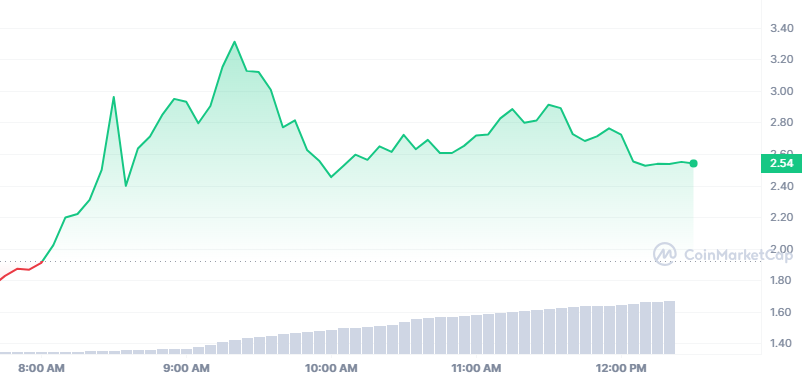OpenAI CEO Sam Altman announced the official launch of his biometrics project, Worldcoin. The project also includes an eponymous cryptocurrency called Worldcoin Token (WLD), which was immediately listed on leading exchanges Binance and Huobi on July 24.
Worldcoin promises people from around the world free money in exchange for a scan of their irises. It built a device called Orb, which it uses to scan eyeballs and capture unique biometric identifiers. The goal is to create a digital identity system that separates humans from AI.
Once the silverball-shaped orb verifies that the person is a real human, it creates a World ID for them. Worldcoin set out to capture the biometric data of one billion people by 2023 when it started three years ago. So far, it has scanned the irises of only two million users globally.
Also read: OpenAI Founder Still Wants Your Eyeballs for ‘Worldcoin’ Currency
Worldcoin rolls out worldwide
In a blog post, Worldcoin founder Altman said the project is rolling out to 35 cities in around 20 countries starting Monday, July 24. He described Worldcoin as “a new identity and financial network owned by everyone.” Previously, the “orbing” operations were available to users in 12 countries.
Those who agree to have their irises scanned receive payment in Worldcoin’s cryptocurrency token WLD. The payment does not apply to people in countries such as the United States, “where the rules are less clear,” said the OpenAI CEO.
“We believe Worldcoin could drastically increase economic opportunity, scale a reliable solution for distinguishing humans from AI online while preserving privacy, [and] enable global democratic processes,” Altman wrote.
“The goal is simple: a global financial and identity network based on proof of personhood. this feels especially important in the AI era,” he added on Twitter.
the goal is simple: a global financial and identity network based on proof of personhood. this feels especially important in the AI era.
i'm hopeful worldcoin can contribute to conversations about how we share access, benefits, and governance of future AI systems.
— Sam Altman (@sama) July 24, 2023
Worldcoin’s World App, a so-called protocol-compatible wallet, is now available for download and users can book time to get verified via the application or at worldcoin.org.
Meanwhile, Binance, the world’s largest cryptocurrency exchange, and Huobi said they will list the Worldcoin token beginning on Monday. On Binance, spot trading WLD pairs include WLD/BTC and WLD/USDT, while Huobi announced only the WLD/USDT pair.
Combating inequalities
Worldcoin comes at a time when generative AI such as ChatGPT has turned the world on its head, making it difficult to separate real humans and artificially intelligent chatbots online. Altman hopes that the World ID could help make that distinction clearer.
“People will be supercharged by AI, which will have massive economic implications,” he told Reuters.
He also spoke about his vision for a universal basic income (UBI), the idea of a government-funded program provided in the form of standard, recurring payments to everyone. He says UBI will be important for ending income disparities for people rendered jobless by AI.
Altman believes that a world with UBI is still a long way off, and he does not know who would be responsible for distributing the money, according to Reuters. However, he said that Worldcoin is laying the groundwork for making UBI a reality.
“We think that we need to start experimenting with things so we can figure out what to do,” he said.
“Worldcoin is an attempt at global scale alignment, the journey will be challenging and the outcome is uncertain. But finding new ways to broadly share the coming technological prosperity is a critical challenge of our time,” Altman wrote in the blog post.
Worldcoin raises privacy concerns
In his announcement, Sam Altman was careful to emphasize issues of privacy. He had to. In the past, Worldcoin has faced harsh criticism over its privacy practices.
Critics talked about the risk of fraud and a lack of protection for the collected data. Analysts also pointed to the threat to user privacy and decentralization as an affront to the founding principles of Bitcoin (BTC).
“It is concerning when private entities start offering monetary incentives to collect personal data without any safeguards and or enforceable restrictions on what they can do with the data,” software developer Brandon Church said previously.
“No one gathers data just to keep it hidden, and private entities have proven time and again that they play fast and loose with user data. Data itself has become a product that can be sold. Providing unique data sets makes for a very lucrative venture,” he added.
Church theorized that Worldcoin would be unable – either willingly or otherwise – to keep the biometric data in a database. He sees history repeating itself (remember past failures by Big Tech to secure personal information, Facebook data leak etc.).
On its part, Worldcoin denies that it stores people’s data. “I think Worldcoin is more privacy-preserving than centralized services we use today,” Altman tweeted in response to Edward Snowden’s criticism in Oct. 2021.
“All Worldcoin, or anyone, could ever tell is if someone has already signed up for the service.”
Later, Worldcoin announced an upgrade to its system to improve user privacy. The company deployed what it called proof-of-personhood (PoP) protocol – a mechanism that leverages zero-knowledge proofs to allow for anonymous actions.
Worldcoin has since raised $115 million in funding from notable investors like Reid Hoffman, the co-founder of Linkedin, crypto billionaire Sam Bankman-Fried, Andreessen Horowitz, and Coinbase Ventures. The firm is run by San Francisco and Berlin-based Tools for Humanity.
Worldcoin (WLD) sees impressive investor interest
WLD’s listing on Binance and Huobi has exposed the token to millions of crypto traders. As of writing, WLD was exchanging hands for $2.5541, had a trading volume of approximately $290 million, a market capitalization of around $266 million, and a projected fully diluted market capitalization of about $26 billion, data from the crypto price tracker CoinMarketCap showed.










 and then
and then